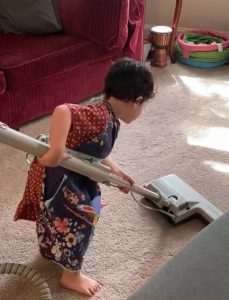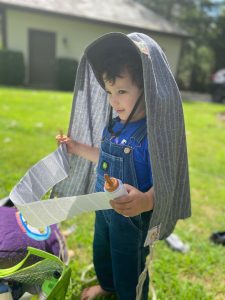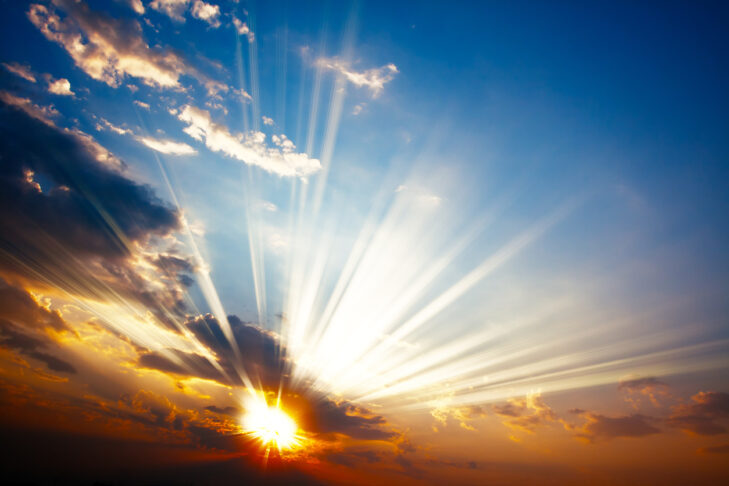Friday afternoons are my toddler’s favorite time of the week. He bounces up and down on the couch singing, “I gonna VAAAcuum dis HOUSE! Dis house needs a VAAAcuuum!” After we toss the Duplos into their basket, he runs to the closet and bodily drags out the vacuum (a hefty Electrolux machine, mind you), wrestles the various nozzles into their places, plugs the cord into the wall (under my supervision), and pushes the Big Vacuum around our rug. After months of just pushing the thing back and forth over the same stretch of carpet, he finally figured out how to move the giant vacuum neck around. This past Shabbat, after about 10 minutes of his attention, our carpet was remarkably clean.

Our Jewish calendar and rituals teach us the importance of physical and mental preparation. Friday afternoon challah-baking and setting the table. Pre-Pesach deep cleaning the kitchen, scrubbing on our hands and knees, ridding our physical space—and hearts—of hametz. Pre-Shavuot counting the Omer, a liturgical practice with origins in the highly physical and sensory act of bringing barley sheaves to the Temple.
There is yet another preparation time gifted us by our calendar, just as important but less widely practiced: the Hebrew month of Elul, which leads up to the new moon of Rosh Hashanah. Elul is the on-ramp to the High Holidays and the entire autumn festival cycle.
Special Elul customs include:
- Inserting Psalm 27 into our daily liturgy (you may know this psalm from singing the words “Ahat she’alti me’et Adonai otah avakesh”/”One thing I ask of God, for this do I yearn”)
- Blowing/hearing shofar every Sunday to Friday morning
- Chanting liturgy called selichot, which ask for God’s forgiveness well in advance of Yom Kippur
- Engaging in personal cheshbon hanefesh—intentional self-reflection and improvement work
Elul gets short shrift in liberal Jewish America for understandable reasons. It usually begins in August when some congregations go light on programming. Many folks go on vacation, followed immediately by the rush of starting a new school year. All this bustle means it’s easy to enter the High Holidays out of breath and unprepared, hearing the shofar for the first time on Rosh Hashanah morning and startling awake.
Instead, Elul gives us the opportunity—begs us, actually—to get personally prepared for the Days of Awe. Journal, make art, pray, talk to loved ones, schedule a few extra therapy sessions. As the days begin to slide toward the autumn equinox, we go inward and inquire: In what ways have I acted in accordance to my highest values this year? In what ways am I falling short? What support do I need to make desired change? Which of my intimate relationships—divine, human, self, earth—need attention in my life?
Sound the great shofar of our freedom, the weekly Amidah prayer implores. Raise a banner to gather in our exiles. The Elul shofar calls not for national redemption but for our internal freedom, for the ingathering, alignment and integration of our disparate needs and experiences—especially those exiled parts of ourselves that haven’t felt the light of love in so long.

Elul is like the magic of pre-Shabbat vacuuming: It is heavy lifting every time. It makes a startlingly loud noise. We have to put in real effort. But like the vacuum, it is satisfying. Things can get a little lighter, a little cleaner—or at least a little clearer. When Rosh Hashanah comes, she does not surprise us with her intensity. Rather, we walk into her as we do our own dining room when we have a beautifully set Shabbat table. “Ah, I know this space,” we say to ourselves. “I made this happen. I did a lot of hard work, and now I get to really bask in the holiday. I am ready.”
You may be excited to dive into Elul’s preparation work. Or you may be exhausted after another 90-degree day in a pandemic with a toddler who has recently dropped his nap, and looking at a full email inbox, a dirty kitchen and posts on Facebook for COVID-safe childcare options.
This is purely hypothetical.
My point is that whether the pandemic has left you with way too much time or not enough time to catch your breath, Elul is coming, and we can walk through it together. Gather us together from the four corners of the earth, the Amidah continues. Pandemic or no, the shofar is about to sound, and this year of all years we need to thoroughly hear its call. Join us.

Rabbi Shoshana Meira Friedman is the director of professional development at Hebrew College.
This post has been contributed by a third party. The opinions, facts and any media content are presented solely by the author, and JewishBoston assumes no responsibility for them. Want to add your voice to the conversation? Publish your own post here. MORE


